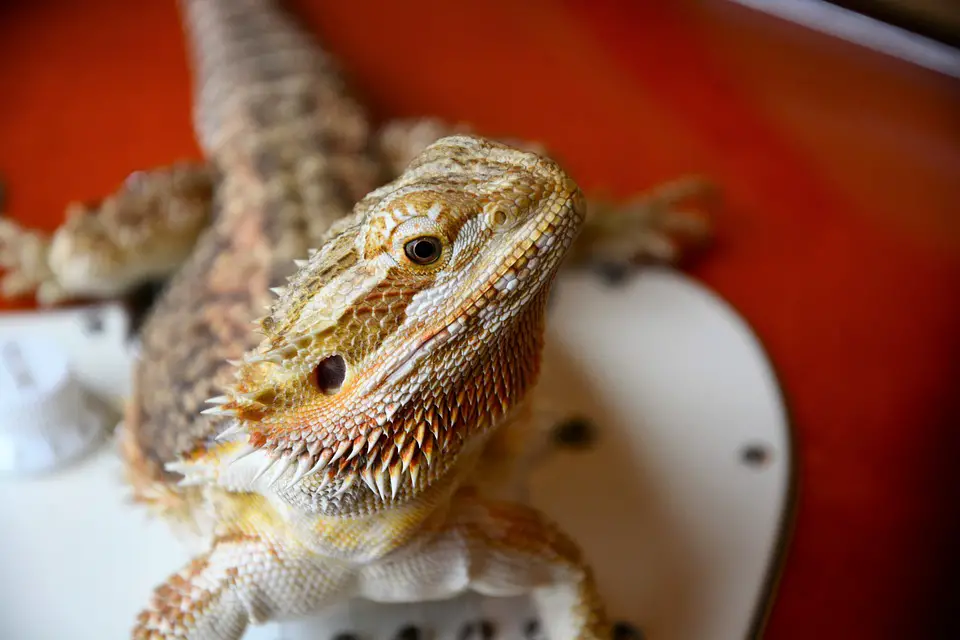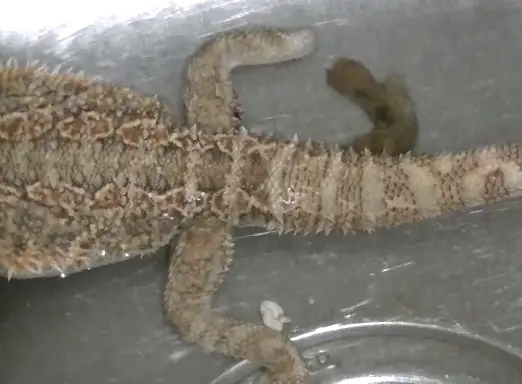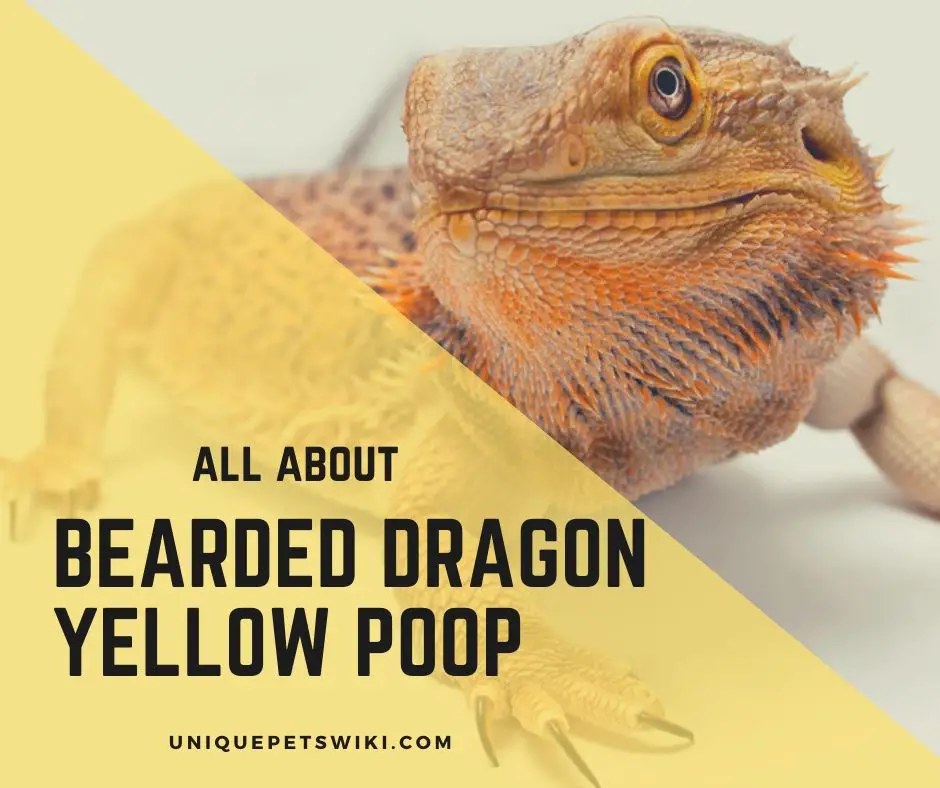What does a standard bearded dragon poop look like? You’ll need to examine your beardie’s stool more frequently; it’s paramount for checking their health status.
If your bearded dragon excretes a yellow poop, you might be concerned. You will want to know whether your beardie excreted product is typical or not.
We’ll learn what a normal dragon poop looks like, reasons for the bearded dragon yellow poop, how to deal with it, and more. Get full information further in the article.
This article has been reviewed by Dr. Dilber. Read more about our knowledge control process here.
Contents
What is the Normal Poop for Bearded Dragon?
Your lizard will never tell you when it’s sick, and this becomes a big challenge. Regular monitoring of its stool status can help you to know if your pet is well or not. Therefore, you need to know how a normal bearded dragon poop looks like.
Typically, a bearded dragon poop tends to have two distinct parts; a solid brown to black part, and it appears white at its end. The white section may be in paste form or a chalky substance.
Whenever you observe a poop looking this way, it indicates that your beardie is healthy, and the systems are functioning effectively. The black to white part are the remains of the digested food, while the white portion consists of urea and uric acid.
Like birds, bearded dragons do not urinate but instead excrete their urine in the form of uric acid. This is a way to conserve water.
Also, our lizards being reptiles possess a cloaca where the feces and urine combine, and it is the same path that the eggs are expelled from the body.
A stool that deviates from brown to black and white may be a sign that your pet has a health problem, but sometimes it’s nothing to make you worry. Sometimes poop color deviates due to the food the bearded dragon has eaten. As the concentration of vegetables and fruits also affects the poop color.
A colored poop can be due to many reasons that we are going to see below.
Why is Bearded Dragon Poop Yellow?

To reiterate, color matters a lot in bearded dragon poop, and it is something that is of great concern. A color change in the beardie’s droppings is a primary way to tell if things are not going well with your pet.
New to bearded dragon? Check out the bearded dragon care sheet now! We had listed out all the things you need to know about bearded dragons as pets. Check it now!
Bearded dragon yellow poop may be a normal or abnormal sign. It may be is the result of the diet with a lot of calcium or too much red/yellow fruit. If that is not your case. Please look for vet advice.
Let’s deep dive more on how to stop the yellow poop for each reason.
First, a yellow poop can result from feeding your beardie with food that has a lot of calcium. It can also affect their urate, which might appear more yellow. Excess UVB light also results in yellow poop.
If that is the case, reduce the level of calcium in food, and the droppings will have obtained its standard color after several days. Also, too much calcium can result in adverse health impacts.
Secondly, excess UVB light also results in yellow poop. Actually, excess UVB causes too much calcium to build up in the bearded dragon’s body. Because the bearded dragon’s body processes UV rays into calcium, D3, and other vitamins. So, excess calcium and other supplements result in yellow poop.
A dragon can also discharge yellow feces if the liver has a problem. It is always recommended to consult a reptile vet if the beardie continues to excrete yellow droppings for some time.
What Other Colors/Signs Indicate Abnormal Bearded Dragon Poop?
Apart from yellow poop, there are other visual signs to help you recognize that your beardie’s poop may have a problem. Probably, you are required to change something up, or it is just a minor issue.
Red or Black Poop
Red or black droppings in the bearded dragon is not necessarily a good sign because your pet may be suffering from impaction.
Impaction is a condition where a bearded dragon ingests indigestible materials like sand, which blocks the digestive system.
Commonly, impaction results in internal tears, which bring about constipation and internal bleeding. However, red or black poop can be due to a large bowel movement. More massive poops can cause minute internal bleeding.
Red poop also indicates that bearded dragon has eaten beets and raspberries. Besides this, Red poop having blood spots is a sign of parasitic infestation, mostly due to coccidia. So, if you notice that your lovely pet has a red or yellow waste continuously, don’t hesitate to contact or visit your vet. But it is good to inform a vet anytime your pet relieves itself droppings with these strange colors.
Soft Loose Poop
Over hydration results in loose poop and sometimes runny poop. Soft runny poop can occur due to the presence of parasites or even because of diet. Typically, bearded dragons are carriers of parasites such as coccidia, protozoa, pinworm, nematodes, etc.
Some parasites like coccidia and pinworms do not express any signs of health problems and in most cases, a loose poop is not considered to be severe. However, if there’s diarrhea and the beardie tends to lose weight, then inform the vet to treat for the parasites.
A soft, loose poop needs timely treatment before it can lead to diarrhea that will dehydrate your beardie.
Bad Smelling Feces
Foul-smelling poop can occur occasionally, and it is not something to worry about; it’s normal. An increased odor may happen because of particular foods, or when the intestinal bacteria rise in the alimentary canal in certain moments.
The only time where you will need to take your pet to a vet is when you notice the stinky smelling pop in multiple times.
New to bearded dragon? Check out the bearded dragon care sheet now! We had listed out all the things you need to know about bearded dragons as pets. Check it now!
Chalky Hard Urate
Typically, the white portion of the bearded dragon feces should be soft, and any different texture means that something might be wrong.
The hard urate may occur when bearded dragons are dehydrated or with excessive calcium in the foods. You may want to reduce the calcium from the diet or cut down on the calcium supplement used.
You can also address the situation by giving your beardie a 20 minutes bath in warm water. It helps the beardie to absorb some water through the skin. Sometimes bearded dragons defecate orange colored poop. Orange color is caused by too many multivitamin supplements in their diet.
How Often Do Bearded Dragons Poop?

(Source: ThePresidentialTourist YouTube)
How many times a beardie poop varies depending on age, type, and the amount of food given. Young bearded dragons poop more frequently than adults.
A young beardie, for instance, will relieve itself anywhere from 1-3 times in a day or even more. It is that way because babies and juveniles consume more food as the body demands a lot since it is growing.
Another reason for pooping more often is because of the high amounts of proteins that the young beardies take. High level of proteins, about 80% is needed to maintain their fast growth.
On the other hand, adults may defecate once in a day, but don’t panic to realize that your dragon is pooping one time in a week. It is still reasonable for them.
Older dragon’s diet has more vegetables, that’s about 80% and reduced proteins, and they also eat minimal food.
If your beardie poops after a period of more than a week or doesn’t poop at all, it can be too much of an issue; you may require to see a vet.
Can a Bearded Dragon Go Without Pooping? For How Long?
Now that you are aware of how often your beardie poop, it is essential to know how long the dragons can go without defecating just in case.
Bearded dragons can stay for a month, and you don’t discover any poop in their enclosure. However, this is something that requires you to monitor your pet in case of something that may not be right.
If your pet has not pooped after a month now, but it is still active, is regularly eating, retains its weight, and everything is right in the tank, then there is no need to panic. A bearded dragon typically doesn’t poop during brumation.
But, if you are much concerned, you can allow a reptile vet to intervene. Sometimes it is the best option if you are ready for an extra cost.
Conclusion
A bearded dragon poop is vital to help you identify potential problems fast. It is necessary to check at your dragons poop every time, weigh the remaining food, and inspect the pet before feeding.
It helps you to notice anything that may be wrong quickly.
For instance, a bearded dragon yellow poop, or other changes from the usual beardie’s poop may require you to contact a vet.
However, in most cases, it is not something serious and only requires you to correct some husbandry issues, which may be causing the problem.
